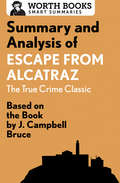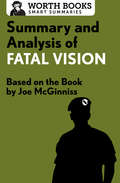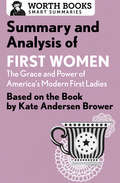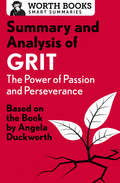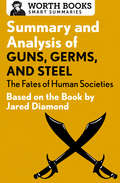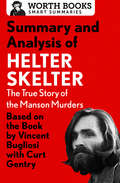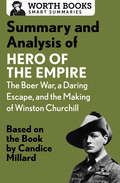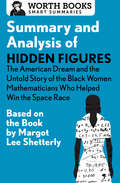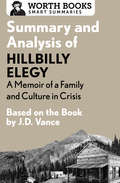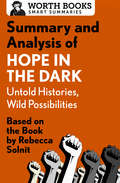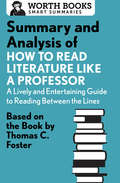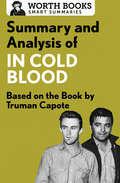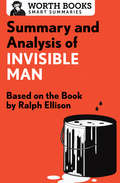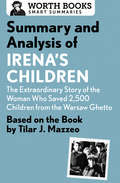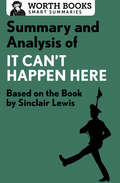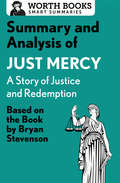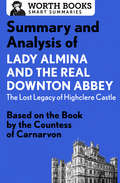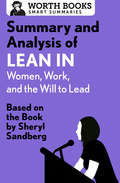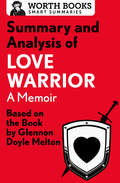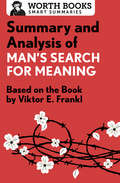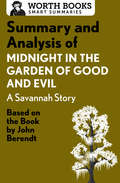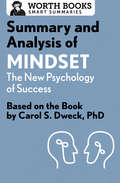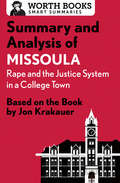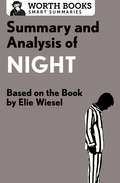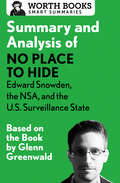- Table View
- List View
Summary and Analysis of Escape from Alcatraz: Based on the Book by J. Campbell Bruce
by Worth BooksSo much to read, so little time? This brief overview of Escape from Alcatraz tells you what you need to know—before or after you read J. Campbell Bruce’s book. Crafted and edited with care, Worth Books set the standard for quality and give you the tools you need to be a well-informed reader. This short summary and analysis of Escape from Alcatraz by J. Campbell Bruce includes: Historical contextChapter-by-chapter summariesImportant quotesFascinating triviaGlossary of termsSupporting material to enhance your understanding of the original work About Escape from Alcatraz by J. Campbell Bruce: A true crime classic, Escape from Alcatraz recounts the history of the infamous prison on Alcatraz Island and the many men who risked their lives trying to escape it. Bruce’s book brings to life the grim, gruesome conditions of life in lockup on Alcatraz, and the prisoners who lived there—from notorious gangster Al “Scarface” Capone to robber Frank Lee Morris, the architect of Alcatraz’s most audacious escape. More than a tale of prison break, Escape from Alcatraz is a scathing indictment of a penal system that strives for dehumanization, rather than rehabilitation, of its prisoners. The summary and analysis in this ebook are intended to complement your reading experience and bring you closer to a great work of nonfiction.
Summary and Analysis of Fatal Vision: Based on the Book by Joe McGinniss
by Worth BooksSo much to read, so little time? This brief overview of Fatal Vision tells you what you need to know before or after you read Joe McGinniss’s book. Crafted and edited with care, Worth Books set the standard for quality and give you the tools you need to be a well-informed reader. This short summary and analysis of Fatal Vision by Joe McGinniss includes: Historical contextSection-by-section overviewsDetailed timeline of key eventsImportant quotesFascinating triviaGlossary of termsSupporting material to enhance your understanding of the original work About Joe McGinniss’s Fatal Vision: In 1970, the country was gripped by a brutal triple-murder at Fort Bragg, North Carolina. Colette MacDonald, then pregnant, and her two young daughters were beaten and stabbed to death in their home. The prime suspect was Colette’s husband, a charismatic military doctor and Green Beret named Jeffrey MacDonald. MacDonald invited writer Joe McGinniss to write a book about the case. Fatal Vision, published in 1983, has become a true crime classic, but not without controversy. In 1984, MacDonald sued McGinniss for fraud, claiming he misrepresented his intentions, making Fatal Vision an incredibly compelling story and an excellent example of the complex questions surrounding free speech and journalistic integrity. The summary and analysis in this ebook are intended to complement your reading experience and bring you closer to a great work of nonfiction.
Summary and Analysis of First Women: Based on the Book by Kate Andersen Brower (Smart Summaries)
by Worth BooksSo much to read, so little time? This brief overview of First Women:The Grace and Power of America&’s Modern First Ladies tells you what you need to know—before or after you read Kate Andersen Brower&’s book. Crafted and edited with care, Worth Books set the standard for quality and give you the tools you need to be a well-informed reader. This short summary and analysis of First Women includes: Historical contextChapter-by-chapter overviewsProfiles of the main charactersDetailed timeline of key eventsImportant quotesFascinating triviaGlossary of termsSupporting material to enhance your understanding of the original workAbout First Women by Kate Andersen Brower: The wife of the president of the United States is inevitably in the spotlight, her every move scrutinized—especially in the modern age of mass media. All eyes are on the First Lady. But how well do we really know these women—their passions, their priorities, their personalities, and the power they wield in public and in private? Political journalist Kate Andersen Brower presents nuanced and enlightening portraits of ten modern First Ladies, from Jacqueline Kennedy to Melania Trump. Learn about their tenure in the White House, motherhood and diplomacy in Washington, and their complex relationships—with their husbands, with one another, and with their staffers. The summary and analysis in this ebook are intended to complement your reading experience and bring you closer to a great work of nonfiction.
Summary and Analysis of Grit: Based on the Book by Angela Duckworth (Smart Summaries)
by Worth BooksSo much to read, so little time? This brief overview of Grit tells you what you need to know—before or after you read Angela Duckworth&’s book. Crafted and edited with care, Worth Books set the standard for quality and give you the tools you need to be a well-informed reader. This short summary and analysis of Grit by Angela Duckworth includes: Historical contextChapter-by-chapter summariesImportant quotesFascinating triviaGlossary of termsSupporting material to enhance your understanding of the original work About Angela Duckworth&’s Grit: Psychologist Angela Duckworth blows the lid off of theories that suggest IQ and socioeconomic status are the sole predictors of success. Not intellectually gifted, according to her traditional, Asian-American father, Duckworth nevertheless became a MacArthur &“Genius.&” Winning the award led her to reflect upon the qualities that got her there: perseverance and passion. Interviewing dozens of the world&’s winners, Duckworth ventures into the playing fields of achievement, speaking with CEOs and coaches, and visits West Point, competitive swim teams, and even the National Spelling Bee to discover the common threads. Pulling from history, as well as cutting-edge neuroscience and behavioral science, Grit offers tips and advice for everyone—from parents to athletes to entrepreneurs—about how getting gritty can help you to succeed. The summary and analysis in this ebook are intended to complement your reading experience and bring you closer to a great work of nonfiction.
Summary and Analysis of Guns, Germs, and Steel: Based on the Book by Jared Diamond
by Worth BooksSo much to read, so little time? This brief overview of Guns, Germs, and Steel tells you what you need to know--before or after you read Jared Diamond's book. Crafted and edited with care, Worth Books set the standard for quality and give you the tools you need to be a well-informed reader. This short summary and analysis of Guns, Germs, and Steel by Jared Diamond includes: Historical contextChapter-by-chapter summariesDetailed timeline of key eventsImportant quotesFascinating triviaGlossary of termsSupporting material to enhance your understanding of the original work About Guns, Germs, and Steel by Jared Diamond: Professor Jared Diamond's informative and fascinating Pulitzer Prize-winning Guns, Germs, and Steel explores a historic question: Why were the Eurasian peoples able to dominate those from other lands? Diamond argues that it was ecology and geography--not race--that shaped the modern world. Societies that developed in regions with fertile land for farming and that had domesticable plants and animals were able to progress more quickly, thereby creating the tools to conquer preliterate cultures. Drawing on a variety of disciplines--from linguistics, genetics, and epidemiology to biology, anthropology, and technology--Guns, Germs, and Steel offers an eloquently argued view of the development of human societies. The summary and analysis in this ebook are intended to complement your reading experience and bring you closer to a great work of nonfiction.
Summary and Analysis of Helter Skelter: Based on the Book by Vincent Bugliosi with Curt Gentry (Smart Summaries)
by Worth BooksSo much to read, so little time? This brief overview of Helter Skelter tells you what you need to know—before or after you read Vincent Bugliosi and Curt Genry&’s book. Crafted and edited with care, Worth Books set the standard for quality and give you the tools you need to be a well-informed reader. This summary of Helter Skelter by Vincent Bugliosi with Curt Gentry includes: Historical contextSection-by-section overviewsDetailed timeline of eventsAnalysis of the main charactersFascinating triviaGlossary of termsSupporting material to enhance your understanding of the original work About Vincent Bugliosi and Curt Gentry&’s Helter Skelter: In the bestselling true crime book Helter Skelter, lead prosecutor Vincent Bugliosi provides a meticulously detailed account of the murders committed by the Manson family and their trial—one of the most sensational criminal cases of the century. From the police investigation of the murders of Leno and Rosemary LaBianca and Sharon Tate, to the arrests, the courtroom antics, and the personalities and motivations of Charles Manson and his followers, Helter Skelter offers a haunting look into the horrific repercussions of cult mentality on a violent rampage. The summary and analysis in this ebook are intended to complement your reading experience and bring you closer to a great work of nonfiction.
Summary and Analysis of Hero of the Empire: Based on the Book by Candice Millard
by Worth BooksSo much to read, so little time? This brief overview of Hero of the Empire tells you what you need to know—before or after you read Candice Millard’s book. Crafted and edited with care, Worth Books set the standard for quality and give you the tools you need to be a well-informed reader. This short summary and analysis of Hero of the Empire includes: Historical contextChapter-by-chapter overviewsProfiles of the main charactersTimeline of key eventsImportant quotesFascinating triviaGlossary of termsSupporting material to enhance your understanding of the original work About Hero of the Empire: The Boer War, a Daring Escape, and the Making of Winston Churchill by Candice Millard: Winston Churchill is a towering figure of the 20th century, but Candice Millard focuses on a much younger Churchill, whose unexpected adventures and heroics helped make him into the charismatic leader he is rememered as. With a trove of period details, a colorful cast of characters, and a deep feeling for 19th-century history, Millard’s biography recounts Churchill’s early military adventures before and during the Boer War. She then puts readers in the middle of that brutal conflict along with a young Churchill, as he rushes toward the daring escape that would bring him the admiration of the British Empire and the beginning of his legendary political career. The summary and analysis in this ebook are intended to complement your reading experience and bring you closer to a great work of nonfiction.
Summary and Analysis of Hidden Figures: Based on the Book by Margot Lee Shetterly (Smart Summaries)
by Worth BooksSo much to read, so little time? Get an overview of Hidden Figures, the true story about the African American female mathematicians who helped NASA win the space race. Margot Lee Shetterly&’s Hidden Figures tells the incredible real-life account of Dorothy Vaughan, Mary Jackson, Katherine Johnson, and Christine Darden—who, in a time when black women faced seemingly insurmountable obstacles, went to work as &“calculators&” at NASA. With pencils, paper, and slide rules, they transformed airplane, rocket, and satellite designs—and ensured a World War II victory. Despite the social and political climate at the height of Jim Crow, these women rose up and became integral to the project that put the first man on the moon. From World War II to the Cold War to the civil rights movement to the space race, Hidden Figures tells the story of four remarkable women whose contributions to science led to some of NASA&’s greatest successes. The book has become a New York Times bestseller as well as a Screen Actors Guild Award–winning and Academy Award–nominated picture starring Taraji P. Henson, Octavia Spencer, Kirsten Dunst, and Kevin Costner. With historical context, important quotes, fascinating trivia, a glossary of terms, and other features, this summary and analysis of Hidden Figures: The American Dream and the Untold Story of the Black Women Mathematicians Who Helped Win the Space Race is intended to complement your reading experience and bring you closer to a great work of nonfiction.
Summary and Analysis of Hillbilly Elegy: Based on the Book by J.D. Vance (Smart Summaries)
by Worth BooksSo much to read, so little time? This brief overview of Hillbilly Elegy tells you what you need to know—before or after you read J.D. Vance&’s book. Crafted and edited with care, Worth Books set the standard for quality and give you the tools you need to be a well-informed reader. This short summary and analysis of Hillbilly Elegy includes: Historical contextChapter-by-chapter overviewsCharacter profilesImportant quotesFascinating triviaGlossary of termsSupporting material to enhance your understanding of the original work About Hillbilly Elegy: A Memoir of a Family and Culture in Crisis by J.D. Vance: Hillbilly Elegy is both an honest, heartbreaking memoir about what it&’s really like to grow up in poverty and strife and a searing, thought-provoking take on the growing class divide in America. Hillbilly Elegy touches on how, as a country, we got here—and what, must be done to reverse the damage. As Ivy League–educated lawyer and Sillicon Valley principal J.D. Vance looks back on his childhood in Jackson, Kentucky, and Ohio, he recalls a youth marred by violence, poverty, and substance abuse, but also one of deep love and family loyalty. He tackles difficult questions about social class, upward mobility, and what it means to feel disenfranchised in your own country. His highly personal account guides readers to an understanding of rural conservatives, and how an entire segment of people transformed from New Deal democrats to right-wing Republicans. The summary and analysis in this ebook are intended to complement your reading experience and bring you closer to a great work of nonfiction.
Summary and Analysis of Hope in the Dark: Based on the Book by Rebecca Solnit
by Worth BooksSo much to read, so little time? This brief overview of Hope in the Dark tells you what you need to know—before or after you read Rebecca Solnit’s book. Crafted and edited with care, Worth Books set the standard for quality and give you the tools you need to be a well-informed reader. This short summary and analysis of Hope in the Dark includes: Historical contextChapter-by-chapter overviewsProfiles of the main charactersDetailed timeline of eventsImportant quotes and analysisFascinating triviaGlossary of termsSupporting material to enhance your understanding of the original workAbout Hope in the Dark: Untold Histories, Wild Possibilities by Rebecca Solnit: Written in response to the 2004 US presidential election, and updated during the 2016 race, Rebecca Solnit’s Hope in the Dark is a call to action for people who find themselves despairing about the political climate of the world today. Hope in the Dark is a long essay that serves as a primer on social and environmental activism and uprisings from the mid-to-late 20th century to the present. Solnit uses this history of protesters, writers, and workers to argue that hope is the necessary catalyst for action. She insists that radicals and revolutionaries must hold onto hope in order to create a world more like the one they want to live in, even in the face of enormous obstacles, and especially in the face of uncertainty. The summary and analysis in this ebook are intended to complement your reading experience and bring you closer to a great work of nonfiction.
Summary and Analysis of How to Read Literature Like a Professor: Based on the Book by Thomas C. Foster (Smart Summaries)
by Worth BooksSo much to read, so little time? This brief overview of How to Read Literature Like a Professor tells you what you need to know—before or after you read Thomas C. Foster&’s book. Crafted and edited with care, Worth Books set the standard for quality and give you the tools you need to be a well-informed reader. This summary of How to Read Literature Like a Professor by Thomas C. Foster includes: Historical contextChapter-by-chapter overviewsImportant quotesFascinating triviaA glossary of termsSupporting material to enhance your understanding of the original work About How to Read Literature Like a Professor by Thomas C. Foster: Thomas C. Foster&’s How to Read Literature Like a Professor is a series of short essays that show readers how to &“read between the lines&” and make great books come alive. Based on Professor Foster&’s years as a teacher of literature, Foster explains how authors use the English language to accomplish their goals and how we can recognize literary ideas in a wide range of works. The tools he offers can be applied to any book—from the classics to the latest blockbusters. The summary and analysis in this ebook are intended to complement your reading experience and bring you closer to a great work of nonfiction.
Summary and Analysis of In Cold Blood: A True Account of a Multiple Murder and Its Consequences
by Worth BooksSo much to read, so little time? This brief overview of In Cold Blood tells you what you need to know—before or after you read Truman Capote’s book. Crafted and edited with care, Worth Books set the standard for quality and give you the tools you need to be a well-informed reader. This short summary and analysis of In Cold Blood by Truman Capote includes: Historical context, Chapter-by-chapter summaries, Detailed timeline of important events, Important quotes, Fascinating trivia, Supporting material to enhance your understanding of the original work. About Truman Capote’s In Cold Blood: A masterpiece of true crime and literary nonfiction, Truman Capote’s In Cold Blood is the story of a 1959 multiple murder in rural Kansas. Combining journalistic research with masterful storytelling, Capote reconstructs the events surrounding the killing of the Clutter family and the crime’s aftermath—from the last day of the Clutters’ lives to the day their murderers are executed. Gripping, chilling, and suspenseful, In Cold Blood is a pioneering work of nonfiction and a highly acclaimed modern American classic. The summary and analysis in this ebook are intended to complement your reading experience and bring you closer to a great work of nonfiction.
Summary and Analysis of Invisible Man
by Worth BooksSo much to read, so little time? This brief overview of Invisible Man tells you what you need to know—before or after you read Ralph Ellison’s book. Crafted and edited with care, Worth Books set the standard for quality and give you the tools you need to be a well-informed reader. This short summary and analysis of Invisible Man by Ralph Ellison includes: Historical context, Chapter-by-chapter summaries, Detailed timeline of key events in Ralph Ellison’s life, Analysis of the main characters, Themes and symbols, A note on the author’s style, Important quotes, Fascinating trivia, Glossary of terms, Supporting material to enhance your understanding of the original work. About Invisible Man by Ralph Ellison: A 20th-century classic, Invisible Man is the story of a young man’s journey to self-discovery—from growing up black in the post-war South, to being expelled from a Negro college, to moving to Harlem and joining an activist organization called the “Brotherhood,” to disappearing into the city’s underbelly and becoming truly invisible…. More than a commentary on issues of race in America, Invisible Man is an extraordinary story of identity, truth, and what it means to be human in a broken world. Winner of the National Book Award, Invisible Man is no less pertinent today than it was upon its initial publication in 1952. The summary and analysis in this ebook are intended to complement your reading experience and bring you closer to a great work of fiction.
Summary and Analysis of Irena's Children: The Extraordinary Story of the Woman Who Saved 2,500 Children from the Warsaw Ghetto
by Worth BooksSo much to read, so little time? This brief overview of Irena’s Children tells you what you need to know—before or after you read Tilar J. Mazzeo’s book. Crafted and edited with care, Worth Books set the standard for quality and give you the tools you need to be a well-informed reader. This short summary and analysis of Irena’s Children includes: Historical context, Chapter-by-chapter overviews, Profiles of the main characters, Detailed timeline of key events, Important quotes, Glossary of terms, Supporting material to enhance your understanding of the original work. About Irena’s Children: The Extraordinary Story of the Woman Who Saved 2,500 Children from the Warsaw Ghetto by Tilar J. Mazzeo: Despite great risks, Irena Sendler, known as the female Oskar Schindler, rescued approximately 2,500 Jewish children from the Warsaw Ghetto—and death. Using a secret underground network to place children in foster families and Catholic orphanages, and providing them with new identities through forged paperwork, Irena was able to smuggle the children out of the ghetto and past the Nazis. She was eventually caught and tortured, and the men and women who worked with her risked the same fate every day. Irena’s Children is the incredible story of a brave woman who would do anything to save the lives of innocent children during the world’s bleakest times. The summary and analysis in this ebook are intended to complement your reading experience and bring you closer to a great work of nonfiction.
Summary and Analysis of It Can't Happen Here: Based on the Book by Sinclair Lewis (Smart Summaries)
by Worth BooksSo much to read, so little time? This brief overview of It Can&’t Happen Here tells you what you need to know—before or after you read Sinclair Lewis&’s book. Crafted and edited with care, Worth Books set the standard for quality and give you the tools you need to be a well-informed reader. This short summary and analysis of It Can&’t Happen Here includes: Historical contextChapter-by-chapter overviewsProfiles of the main charactersDetailed timeline of key eventsThemes and symbolsImportant quotes and analysisFascinating triviaGlossary of termsSupporting material to enhance your understanding of the original work About It Can&’t Happen Here by Sinclair Lewis: Sinclair Lewis&’s satirical novel It Can&’t Happen Here documents the rise of a fascist government in the United States. It follows a small town newspaper editor, Doremus Jessup, as he watches his country come out of economic depression only to embrace a smoke-and-mirrors presidential candidate who wraps himself in patriotic zeal. This charismatic demagogue and his cronies amass power and wealth as the rest of the population watches its rights and freedoms disappear. There is censorship, the random violence of an unchecked paramilitary force, and the emergence of concentration camps. Jews, foreigners, and intellectuals are singled out for especially brutal treatment. Universities are taken over and books are burned. As he watches the devastating toll exacted from his friends and family, the once easygoing Jessup is swept into an underground resistance movement in which he must ignore his moral compass. A revolution is launched, but the outcome is uncertain. Lewis&’s dystopian work asks: could it happen here and, if it does, how would it be stopped? The summary and analysis in this ebook are intended to complement your reading experience and bring you closer to a great work of fiction.
Summary and Analysis of Just Mercy: Based on the Book by Bryan Stevenson
by Worth BooksSo much to read, so little time? This brief overview of Just Mercy: A Story of Justice and Redemption tells you what you need to know—before or after you read Bryan Stevenson book. Crafted and edited with care, Worth Books set the standard for quality and give you the tools you need to be a well-informed reader. This short summary and analysis of Just Mercy includes: Historical contextChapter-by-chapter overviewsCharacter profilesDetailed timeline of key eventsImportant quotes and analysisFascinating triviaGlossary of termsSupporting material to enhance your understanding of the original work About Just Mercy: A Story of Justice and Redemption by Bryan Stevenson: Just Mercy is a heartbreaking—but not entirely hopeless—look inside the American criminal justice system. The guide on this journey to death row, judges’ chambers, and courthouses small and large is Bryan Stevenson, one of the country’s foremost criminal justice reformers and the founder of the Equal Justice Initiative, the acclaimed legal aid organization based in Montgomery, Alabama. In Stevenson’s chronicle, the only thing standing between death or life imprisonment is an underpaid, overworked lawyer. The summary and analysis in this ebook are intended to complement your reading experience and bring you closer to a great work of nonfiction.
Summary and Analysis of Lady Almina and the Real Downton Abbey: Based on the Book by the Countess of Carnarvon
by Worth BooksSo much to read, so little time? This brief overview of Lady Almina and the Real Downton Abbey tells you what you need to know—before or after you read the Countess of Carnarvon’s book. Crafted and edited with care, Worth Books set the standard for quality and give you the tools you need to be a well-informed reader. This short summary and analysis of Lady Almina and the Real Downton Abbey: The Lost Legacy of Highclere Castle includes: Historical contextChapter-by-chapter overviewsProfiles of the main charactersDetailed timeline of key eventsImportant quotesFascinating triviaGlossary of termsSupporting material to enhance your understanding of the original work About Lady Almina and the Real Downton Abbey by the Countess of Carnarvon: Lady Almina, the 5th Countess of Carnarvon, was known for throwing fabulous parties at Highclere Castle during the Edwardian era and for turning her home into a hospital for wounded soldiers during World War I. Her biography provides a view of what it was like to live during a time of great joy and of immense sorrow, all in the place that inspired the Emmy Award–winning period drama Downton Abbey. Lady Fiona Carnarvon, the 8th Countess of Carnarvon, knows Highclere Castle—her current residence, which has been in her husband’s family since 1679—better than just about anyone. Drawing from the family’s personal archives of photographs, letters, household records, and journals, Lady Fiona give readers an inside view of the famous English country home and the remarkable woman at the center of it all. The summary and analysis in this ebook are intended to complement your reading experience and bring you closer to a great work of nonfiction.
Summary and Analysis of Lean In: Based on the Book by Sheryl Sandberg
by Worth BooksSo much to read, so little time? This brief overview of Lean In tells you what you need to know—before or after you read Sheryl Sandberg’s book. Crafted and edited with care, Worth Books set the standard for quality and give you the tools you need to be a well-informed reader. This short summary and analysis of Lean In by Sheryl Sandberg includes: Historical contextChapter-by-chapter summariesProfiles of the main charactersImportant quotesFascinating triviaGlossary of termsSupporting material to enhance your understanding of the original work About Lean In by Sheryl Sandberg: Lean In is a modern-day manifesto for women who aspire to rise to the top of their careers, as well as a pointed look at the many ways in which gender bias is reinforced in the workplace. With knowledge gleaned from Sheryl Sandberg’s experiences at Google and Facebook, and with insights from her from friends, mentors, and scientific studies, Lean In offers wisdom and inspiration to current and future leaders. With detailed steps and strategies, Sandberg shows how to lean in to our personal lives and careers—and how to help others achieve and succeed. The summary and analysis in this ebook are intended to complement your reading experience and bring you closer to a great work of nonfiction.
Summary and Analysis of Love Warrior: Based on the Book by Glennon Doyle Melton
by Worth BooksSo much to read, so little time? This brief overview of Love Warrior tells you what you need to know—before or after you read Glennon Doyle Melton’s book. Crafted and edited with care, Worth Books set the standard for quality and give you the tools you need to be a well-informed reader. This short summary and analysis of Love Warrior by Glennon Doyle Melton includes: Historical contextChapter-by-chapter summariesCharacter analysisImportant quotesFascinating triviaSupporting material to enhance your understanding of the original work About Love Warrior by Glennon Doyle Melton: Written with unflinching honesty and hard-earned wisdom, Glennon Doyle Melton’s memoir, Love Warrior, is the story of one woman’s journey from devastating heartbreak after her husband’s infidelity to a new understanding of what it means to love, to marry, and to be a woman. The summary and analysis in this ebook are intended to complement your reading experience and bring you closer to great work of nonfiction.
Summary and Analysis of Man's Search for Meaning: Based on the Book by Victor E. Frankl (Smart Summaries)
by Worth BooksSo much to read, so little time? This brief overview of Man&’s Search for Meaning tells you what you need to know—before or after you read Viktor E. Frankl&’s book. Crafted and edited with care, Worth Books set the standard for quality and give you the tools you need to be a well-informed reader. This short summary and analysis of Man&’s Search for Meaning by Viktor E. Frankl includes: Historical contextChapter-by-chapter summariesImportant quotesFascinating triviaGlossary of termsSupporting material to enhance your understanding of the original work About Man&’s Search for Meaning by Viktor E. Frankl: Written just after World War II, Viktor Frankl&’s international bestseller Man&’s Search for Meaning is both a heartbreaking memoir and a source of inspiration for millions of readers. Dr. Frankl&’s description of his time in a string of Nazi concentration camps is a fascinating, mandatory read for anyone wanting a better understanding of the Holocaust. A highly respected psychotherapist, his ideas on human emotion, the mind, mental health, tragic optimism, and the day-to-day neuroses of common people in the modern world provide spiritual guidance as each of us searches for meaning in our own lives. The summary and analysis in this ebook are intended to complement your reading experience and bring you closer to a great work of nonfiction.
Summary and Analysis of Midnight in the Garden of Good and Evil: Based on the Book by John Berendt (Smart Summaries)
by Worth BooksSo much to read, so little time? This brief overview of Midnight in the Garden of Good and Evil tells you what you need to know—before or after you read John Berendt&’s book. Crafted and edited with care, Worth Books set the standard for quality and give you the tools you need to be a well-informed reader. This short summary and analysis of Midnight in the Garden of Good and Evil: A Savannah Story includes: Historical contextChapter-by-chapter overviewsProfiles of the main charactersWhat&’s what in SavannahImportant quotesFascinating triviaGlossary of termsSupporting material to enhance your understanding of the original work About Midnight in the Garden of Good and Evil: A Savannah Story by John Berendt: John Berendt&’s engrossing bestseller Midnight in the Garden of Good and Evil tells the story of his time spent in Savannah, Georgia. Berendt didn&’t just observe the city&’s lovely locales and its quirky characters—he also became immersed in a murder case that would shock and fascinate much of Georgia. Part true crime saga, part travel diary, part reportage, Midnight in the Garden of Good and Evil is a suspenseful, sharply observed account of Berendt&’s sojourns in Savannah and the murder trial of one if its socialites. The summary and analysis in this ebook are intended to complement your reading experience and bring you closer to a great work of nonfiction.
Summary and Analysis of Mindset: Based on the Book by Carol S. Dweck, PhD (Smart Summaries)
by Worth BooksSo much to read, so little time? This brief overview of Mindset: The New Psychology of Success tells you what you need to know—before or after you read Carol Dweck&’s book. Crafted and edited with care, Worth Books set the standard for quality and give you the tools you need to be a well-informed reader. This short summary and analysis of Mindset includes: Historical contextChapter-by-chapter overviewsProfiles of the main charactersDetailed timeline of eventsImportant quotesFascinating triviaGlossary of termsSupporting material to enhance your understanding of the original workAbout Mindset: The New Psychology of Success by Carol Dweck: Why do some people flourish when faced with a challenge, while others crumble? This is the question that has defined Stanford psychology professor Carol Dweck&’s decades of research, resulting in her ground-breaking theory of mindset. Dweck believes that talent and intelligence do not tell the full story about one&’s ability to achieve. Instead, what determines personal success is whether one has a fixed or growth mindset; the first is a belief that our qualities and strengths cannot be altered, and the second way of thinking supports the idea that they can change over time. Based on meticulous research, and with anecdotes about successful CEOs, athletes, artists, and educators who achieved greatness through attitude as much as ability, Mindset offers new ways of thinking about motivation and personal development. The summary and analysis in this ebook are intended to complement your reading experience and bring you closer to a great work of nonfiction.
Summary and Analysis of Missoula: Based on the Book by Jon Krakauer
by Worth BooksSo much to read, so little time? This brief overview of Missoula tells you what you need to know—before or after you read Jon Krakauer’s book. Crafted and edited with care, Worth Books set the standard for quality and give you the tools you need to be a well-informed reader. This short summary and analysis of Missoula by Jon Krakauer includes: •Historical context •Case-by-case summaries •Profiles of the main characters •Detailed timeline of key events •Important quotes •Supporting material to enhance your understanding of the original work About Missoula by Jon Krakauer: Between 2010 and 2014, there was a spate of sexual assaults in the university town of Missoula, Montana, which drew the attention of the national media—and the Department of Justice. Centering around five cases of sexual assault at the University of Montana, Jon Krakauer’s account shows how one city became a microcosm for how campus rape is handled in the United States. Krakauer draws on police interviews, court testimony, and extensive research to reveal the complacency, failures, and successes of the prosecutors, the victims, the Missoula police, and the university in the handling of these disturbingly frequent sexual assault cases. The summary and analysis in this ebook are intended to complement your reading experience and bring you closer to a great work of nonfiction.
Summary and Analysis of Night: Based on the Book by Elie Wiesel
by Worth BooksSo much to read, so little time? This brief overview of Night tells you what you need to know—before or after you read Elie Wiesel’s book. Crafted and edited with care, Worth Books set the standard for quality and give you the tools you need to be a well-informed reader. This short summary and analysis of Night includes: Historical contextChapter-by-chapter overviewsAnalysis of the main charactersThemes and symbolsImportant quotesFascinating triviaGlossary of termsSupporting material to enhance your understanding of the original workAbout Night by Elie Wiesel: The gripping memoir by Nobel Laureate Elie Wiesel is one of the fundamental texts of Holocaust reportage and a poetic examination of a young man’s loss of faith amid unspeakable acts of inhumanity. Wiesel was 15 years old when he was sent to Auschwitz with his mother, father, and three sisters. Wiesel recalls his horrifying ordeal, including the sadistic Nazi overseers, the death of his mother and younger sister, watching fellow prisoners disappear into the crematorium, the bloody death march to Gleiwitz, and the heartbreaking fatal beating of his father only months before the camp’s liberation. Night is a poignant representation of one young Jewish man’s pain amidst the violent details of the worst genocide in world history. It is an invaluable record of the past as well as an ever-relevant warning about the consequences of fascism and bigotry. The summary and analysis in this ebook are intended to complement your reading experience and bring you closer to a great work of nonfiction.
Summary and Analysis of No Place to Hide: Based on the Book by Glenn Greenwald (Smart Summaries)
by Worth BooksSo much to read, so little time? This brief overview of No Place to Hide tells you what you need to know—before or after you read Glenn Greenwald&’s book. Crafted and edited with care, Worth Books set the standard for quality and give you the tools you need to be a well-informed reader. This short summary and analysis of No Place to Hide includes: Historical contextChapter-by-chapter overviewsCharacter profilesDetailed timeline of key eventsImportant quotes and analysisFascinating triviaGlossary of termsSupporting material to enhance your understanding of the original workAbout No Place to Hide: Edward Snowden, the NSA, and the U.S. Surveillance State by Glenn Greenwald: Journalist and constitutional lawyer Glenn Greenwald&’s No Place to Hide is a personal narrative about his communication with Edward Snowden and an extensive exploration of the true nature, size, and impact of global NSA surveillance. Greenwald&’s book is a fascinating firsthand account that explores issues of privacy in the digital age; the reach of the NSA; and its power to watch our every move, monitor trade negotiations, and coerce citizens into action. The summary and analysis in this ebook are intended to complement your reading experience and bring you closer to a great work of nonfiction.
